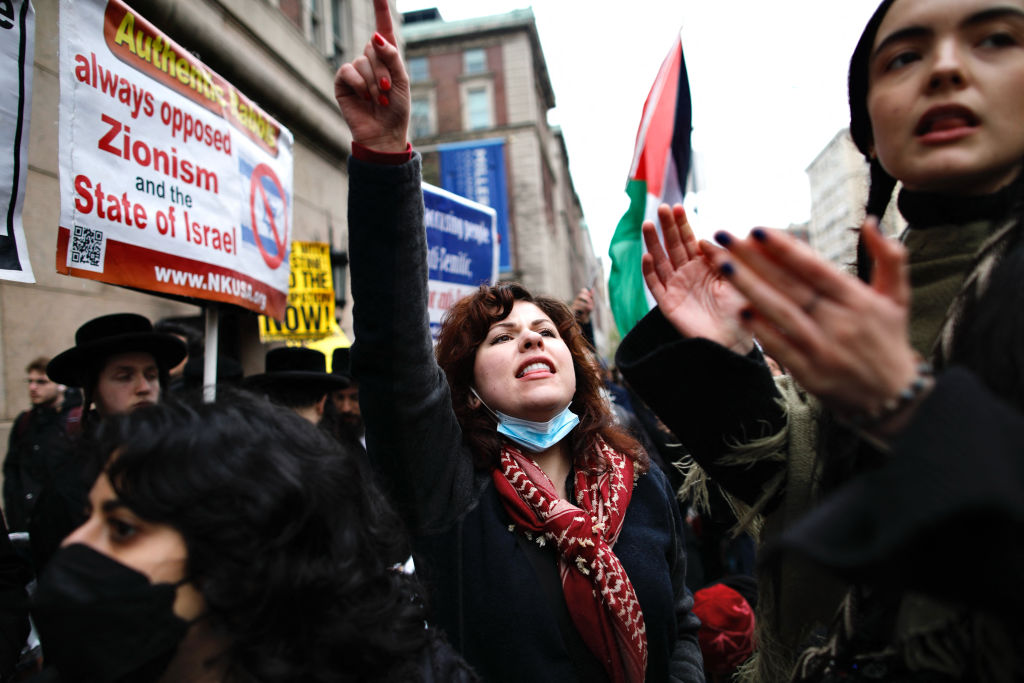
The White House condemned antisemitism on college campuses, days after New York City police dispersed a pro-Palestinian rally at Columbia University and arrested more than 100 students.
Though it avoided naming a specific university, the White House statement is the latest sign of how campus tensions spurred by the Israel-Hamas war are influencing U.S. politics in a presidential election year.
“While every American has the right to peaceful protest, calls for violence and physical intimidation targeting Jewish students and the Jewish community are blatantly antisemitic, unconscionable, and dangerous,” White House Deputy Press Secretary Andrew Bates said. “They have absolutely no place on any college campus, or anywhere in the United States of America.”
New York City Mayor Eric Adams said he was “horrified and disgusted with the antisemitism being spewed at and around the Columbia University campus.” In a post on X, he said he had instructed the police to investigate “any violation of law.”
The rally at Columbia started Thursday, a day after Columbia President Nemat Shafik testified at a House hearing on campus antisemitism. Among the 108 students arrested was Isra Hirsi, daughter of Representative Ilhan Omar, a Democrat from Minnesota.
Congresswoman Elise Stefanik, a New York Republican, criticized Shafik’s leadership of the university in a post on X, saying Sunday that “Columbia’s leadership has clearly lost control of its campus putting Jewish students’ safety at risk.” She called on Shafik to resign.
Stefanik was among the lawmakers who pressed Shafik on Wednesday about praise by some Columbia professors for Hamas’s attack on Israel on Oct. 7. The invasion prompted an Israeli assault on the Hamas-controlled Gaza Strip.
A group of Columbia student organizers pushed back on the White House criticism late Sunday, saying they “reject any form of hate or bigotry” and “are frustrated by media distractions focusing on inflammatory individuals who do not represent us.”
Billionaire Bill Ackman, who has repeatedly criticized antisemitism in the wake of Hamas’s attack, took aim at the leaders of Columbia, Harvard University and Massachusetts Institute of Technology, contrasting them with “other well managed elite universities.”
Harvard University restricted access to Harvard Yard through Friday to decrease the likelihood of disruptive protests, the school’s student newspaper reported late Sunday. The restrictions include spot checks for university identifications and prohibitions on items such as tents and tables without prior approval, the Harvard Crimson reported.
Yale University President Peter Salovey responded to protests on his university’s campus, saying Sunday that while Yale supports “free speech and civil discourse,” it’s committed “to campus safety, peaceful assembly, and civil discourse.”
More Must-Reads From TIME
- The 100 Most Influential People of 2024
- How Far Trump Would Go
- Scenes From Pro-Palestinian Encampments Across U.S. Universities
- Saving Seconds Is Better Than Hours
- Why Your Breakfast Should Start with a Vegetable
- 6 Compliments That Land Every Time
- Welcome to the Golden Age of Ryan Gosling
- Want Weekly Recs on What to Watch, Read, and More? Sign Up for Worth Your Time
Contact us at letters@time.com